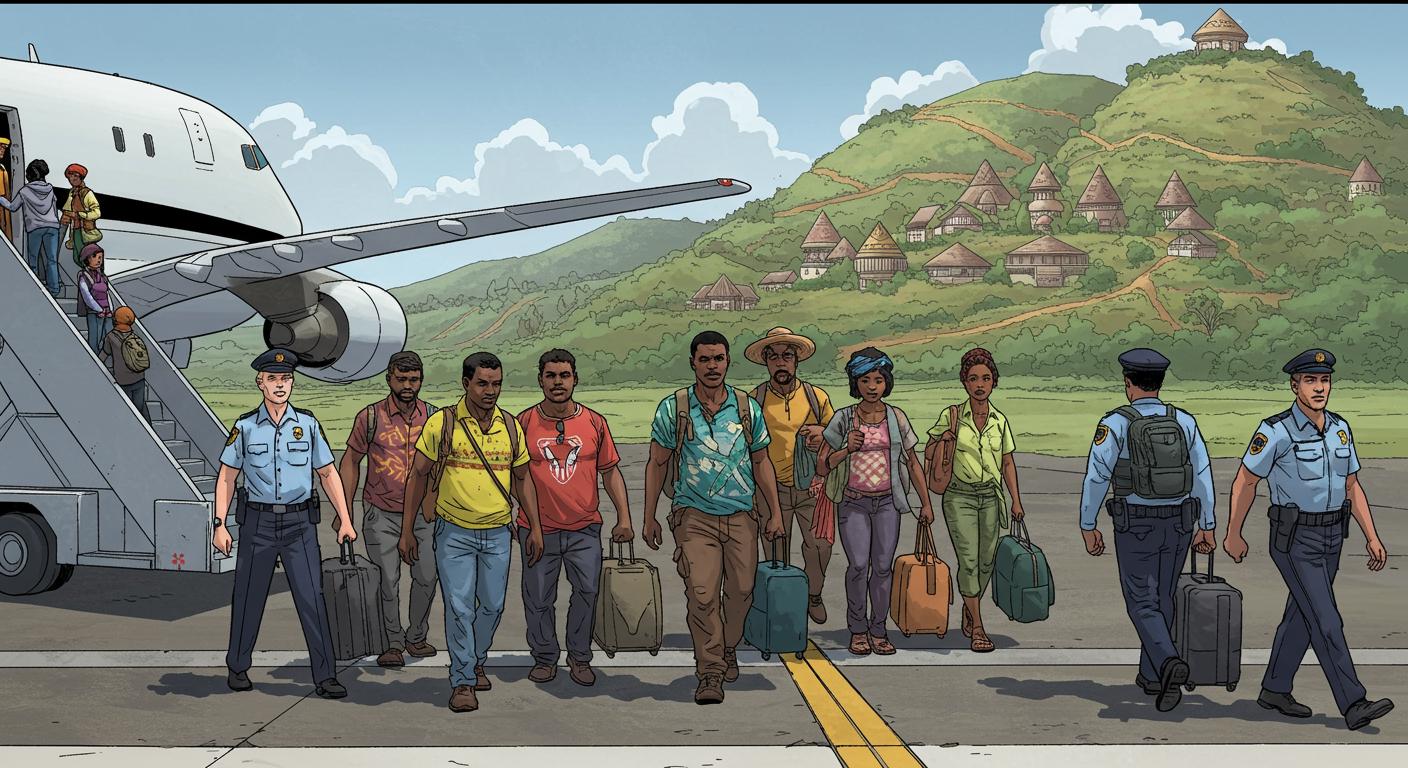File this one under “did I just read that right?” In the ever-expanding catalogue of international oddities, the United States has quietly begun deporting convicted immigrants—not to their home countries, but to the southern African monarchy of Eswatini. Yes, Eswatini: land of royal decrees, vibrant festivals, absolute monarchy, and, apparently, involuntary hosts for America’s unwanted.
Deportation Roulette: When Home Isn’t an Option
According to reporting by the Associated Press, five men, citizens of Vietnam, Jamaica, Cuba, Yemen, and Laos, were loaded onto a U.S. deportation plane and shipped to Eswatini. U.S. Homeland Security Assistant Secretary Tricia McLaughlin, in a late-night post on X, described these individuals as convicted criminals who were refused repatriation by their own countries due to the severity of their offenses—including murder, child rape, and, in the case of one, confirmed gang association. Although McLaughlin included their mug shots and criminal records in her posts, the men’s names weren’t shared with the public.
This action is part of a broader, largely secretive “third-country” deportation initiative. The AP reports that under this policy, the U.S. has begun shipping certain deportees to countries with which they have no existing ties, after the Supreme Court lifted restrictions on removals to such locations. Eight men described as violent criminals were recently sent to South Sudan in a similar fashion. Curiously—or perhaps tellingly—the South Sudanese government hasn’t said where the men are or what’s become of them after custody was transferred nearly two weeks ago.
Eswatini’s Unexpected Role in Deportation Diplomacy
The AP notes that Eswatini, Africa’s last absolute monarchy, is unexpectedly playing host, at least for now. With a population of just over 1.2 million and sandwiched between South Africa and Mozambique, Eswatini’s leadership has a reputation for strongman rule. Since 1986, King Mswati III has governed by decree, with political parties effectively banned. Pro-democracy activists have long accused the regime of crushing dissent, sometimes violently—a situation that boiled over into deadly protests in 2021, as detailed by the AP.
Eswatini’s government, in a series of social media statements cited in both the AP and WNYT stories, stated that the men are being held in isolated, unnamed correctional facilities. Authorities characterized them as “prisoners” and “inmates” in transit, with the plan being to repatriate them to their original countries at some unspecified future time. Eswatini claims this arrangement poses “no security threat” and results from months of high-level negotiations with the U.S.
In collaboration with the United Nations migration agency, Eswatini insists that “due process and respect for human rights is followed.” Still, considering the U.S. State Department’s own 2023 report on Eswatini documented unlawful killings, impunity for abuses, and harsh prison conditions, as noted by Amnesty International’s Amy Fischer in both AP reports, assurances of humane treatment may be viewed with a healthy helping of skepticism. Fischer succinctly observes, “As a result, anyone returned to this country is at risk of serious human rights violations. The cruelty is the point.”
Third-Country Deportations: The Veil of Secrecy
The legal mechanics of sending individuals to countries where they have no ties are, unsurprisingly, as obscure as the destinations. Trina Realmuto, a lawyer with the National Immigration Litigation Alliance, told the AP that the process is shrouded in secrecy: “It’s disturbing that we don’t know what the exchange was to get Eswatini to accept these individuals. We don’t know if there were diplomatic assurances and, if so, what they said. We don’t know if these individuals were given notice. It’s all done in secrecy.”
A memo to Immigration and Customs Enforcement (ICE) staff, referenced by AP, explains that if the U.S. receives what the State Department believes are credible assurances that deportees won’t be tortured in the third country, they can be sent without further procedure. If not, ICE must give notice—sometimes as little as six hours’ warning—and only interviews the person about possible fear of persecution or torture if the concern is explicitly raised and the individual can meet a steep evidentiary burden. As Realmuto pointed out to the AP, “It’s an impossible standard to meet, especially if the person is not knowledgeable about the country.”
The whole operation, the AP underscores, is carefully structured to be opaque. The underlying message, as Realmuto contends, appears intended to deter: potential deportees can’t know if their final stop will be a country where they have no connections and no protection.
The Global Shuffle: More Deals on the Table
This is not a one-off experiment. The AP documents the Trump administration’s active push for more such agreements with African governments. At a White House summit, the subject of receiving U.S. deportees was discussed with leaders from several West African nations. Some, like Nigeria, have forcefully refused to host non-citizens; a Nigerian official was quoted by AP emphasizing the nation’s rejection of U.S. pressure to accept third-country deportees.
Eswatini, it seems, wasn’t the only candidate. Rwanda’s foreign minister told the AP that talks with the U.S. about a similar arrangement are ongoing. There’s precedent in other parts of the world as well: the AP outlines that hundreds of Venezuelans and others have been deported from the U.S. to Costa Rica, El Salvador, and Panama. Not everyone is eager to follow suit—the U.K. Supreme Court, for example, ruled Britain’s plan to send asylum-seekers to Rwanda illegal last year.
Commentators interviewed by the AP suggest that countries accepting third-country deportees may receive, in exchange, favorable terms on tariffs, aid packages, investment, or travel visas. It’s transactional diplomacy with a distinctly twenty-first-century coat of paint.
Eswatini’s Domestic Picture: King Mswati III’s Realm
All this would be easier to file under “bureaucratic oddities” if Eswatini’s domestic realities weren’t so stark. As both AP reports chronicle, the monarchy’s record features the suppression of opposition, reported political assassinations, and frequent imprisonments of critics. Pro-democracy protests in 2021 were met with violence from security forces, and repeated allegations of impunity hang over the country’s authorities.
Against this backdrop, one has to wonder just how much protection or oversight awaits someone “in transit” through Eswatini’s penal system, regardless of the arrangement’s diplomatic sheen. If anything, the contrast highlights the sheer incongruity of shipping people to the far side of the world, into a political environment they may know nothing about.
Who’s Keeping Score?
From the perspective of U.S. officials, as outlined by the AP, these removals are couched in terms of public safety and necessity—removing “barbaric” offenders refused by their home countries. Yet, as noted by Amnesty International and echoed by legal advocates, the policy is seen as fraught with human rights risk. Is the offshoring of difficult cases to “far-flung” nations a legitimate tool of modern migration enforcement, or a cautionary tale for the globalized age?
Sometimes, the world’s weirdness isn’t the stuff of legends or internet myth, but the quiet product of official memos, after-hours flights, and handshake deals between unlikely partners. You have to wonder: when did international diplomacy start looking so much like an assembly of late-night “risk management” meetings, with a globe and a blindfold?







